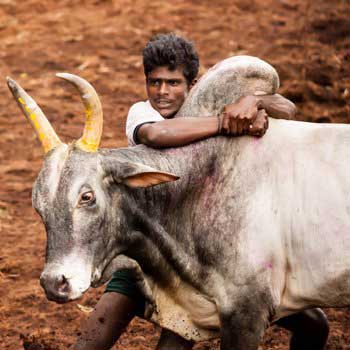Exploring the Rich Heritage of Jallikattu: A Deep Dive into the History and Traditions of Tamil Nadu's

Jallikattu Festivals, Tamil Nadu
Jallikattu is the typical Tamilian festival that falls on the second day of Pongal (January). During this day, the cows, bulls, and buffalos are given a complete wash, beautified with garlands, and worshipped in the morning. The most welcoming event of this day is the bull taming called Jallikattu in the late afternoons. Do not ever miss a chance to enjoy this exciting sport.
What special?
One such ancient valour sport is Jallikattu, known by many names such as Erthaluval, Erukol, Manjuviratu, and Madu Pidithal. Eru, Manju, and Madu—all three words refer to Ox. The sole purpose of this game is to demonstrate the oxen's fierce character and the unmatched bravery of the Tamil men who tame them.
Agriculture is the culture of Tamil Nadu. When we talk about agriculture, it is not a one-man army; it is a crew where both animals and humans work together, sharing a brotherhood. Cattle is the pride of a farmer, and the rich Tamil culture says to revere the cattle as gods. This is why every cow is worshipped as Goddess Lakshmi, and every ox is honourably known as God Nandhi.
Significance:
Jallikattu is an adventurous sport in Tamil Nadu and is part of the Pongal celebration. This sport takes place on the eve of Mattu Pongal (Cow Pongal) in January. One of the living ancient sports of Tamil Nadu and is celebrated with great enthusiasm in the villages in and around Madurai. The native breed of Tamil Nadu, the Kangeyam ox is bred only for this sport. These oxen are very aggressive and ferocious by nature. Taming these bulls is not an easy task that requires skill, power, and strength. So the one who tames these bulls is considered, the strongest person and is honoured with titles.
Conclusion:
Jallikattu celebrations are unique due to their rich cultural and historical background. This age-old sport of taming bulls not only honours the community's treasured cow but also showcases courage and expertise. Jallikattu competitions combine athleticism, history, and local pride by uniting participants who bravely and nimbly strive to tame fierce bulls. The festivities also serve as a lively celebration of Tamil heritage, drawing visitors and participants to observe and take part in this ancient custom from all over the region.
FAQs about Jallikattu Festivals in Tamil Nadu
1.What is Jallikattu and when is it celebrated
Jallikattu is an ancient bull-taming sport celebrated on the second day of Pongal, known as Mattu Pongal typically in January.
2.What are the origins of Jallikattu?
Jallikattu has its roots in Tamil Nadu's agrarian culture, dating back over 2,000 years. It showcases the bravery and skill of the Tamil men in taming aggressive bulls.
3.What breeds of bulls are used in Jallikattu?
The Kangeyam ox, a native breed of Tamil Nadu, is specifically bred for Jallikattu due to its aggressive and ferocious nature.
4.Why is Jallikattu considered significant in Tamil culture?
Jallikattu symbolizes the integral relationship between farmers and their cattle, reflecting agricultural traditions and the cultural reverence for cattle as sacred beings.
5.How is Jallikattu celebrated?
Bulls are washed, decorated with garlands, and worshipped in the morning. The bull-taming event occurs in the afternoon, where participants try to tame the bulls, showcasing their strength and bravery.
6.What are some other names for Jallikattu?
Jallikattu is also known as Erthaluval, Erukol, Manjuviratu, and Madu Pidithal, with all names referring to ox-related activities.
7.How does Jallikattu attract visitors and participants?
Jallikattu draws both participants and spectators from across the region due to its thrilling nature, cultural significance, and the opportunity to witness an ancient tradition that honours Tamil heritage.